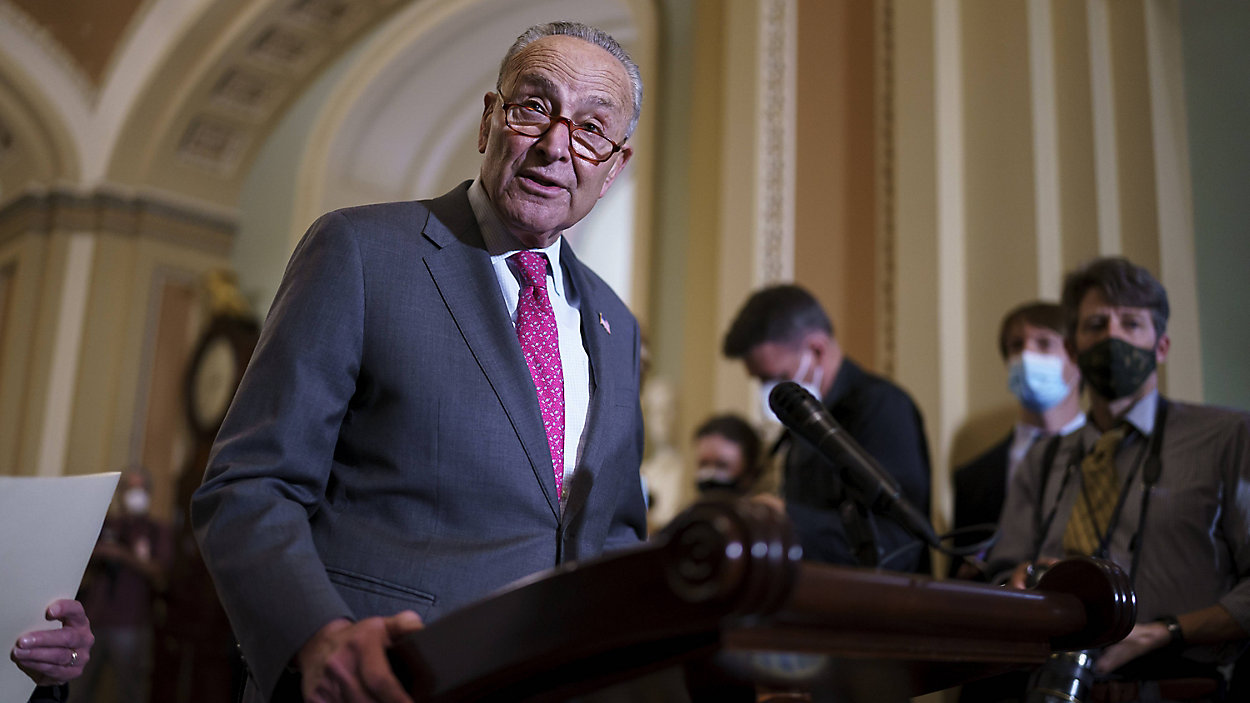As the government shutdown entered its thirty-ninth day — the longest in U.S. history — a rare moment of open tension unfolded on the Senate floor. The exchange, brief but revealing, highlighted just how fractured negotiations have become and underscored the growing frustration among Republicans over what they say is Democratic obstruction disguised as last-minute “solutions.”
Over the weekend, Senate Minority Leader Chuck Schumer approached Sen. Bernie Moreno (R-Ohio) to pitch a new proposal: a one-year extension of Affordable Care Act subsidies. Democrats framed the idea as a temporary bandage to help Americans worried about rising insurance costs during the shutdown. But as Moreno quickly discovered, the proposal had one glaring problem — it didn’t exist on paper.
And when he pressed Schumer for details, especially regarding who would qualify for the subsidies, the Democratic leader abruptly walked away.
The Proposal With No Paper Trail
By Saturday, Democrats were under heavy pressure. Polls showed growing anger from both moderates and independents, and a number of Democratic senators privately acknowledged the shutdown strategy was backfiring. Schumer arrived on the Senate floor suggesting he had a “simple fix” that would offer temporary breathing room.
Except there was nothing written down.
“We can’t give you a counter in writing,” Schumer told Moreno, adding that Democrats would simply attach “two sentences” to extend ACA benefits for one year.
Moreno didn’t need much time to notice what was missing.
“So for one year, people making millions of dollars would still receive these COVID-era subsidies?” he asked.
Schumer attempted to sidestep the question, arguing that income caps could be negotiated later — after the subsidies were already extended. Moreno didn’t buy it, noting that the lack of guardrails meant wealthy individuals could still qualify for taxpayer-funded subsidies originally created as emergency pandemic measures.
He pushed again, mentioning that such subsidies had been plagued with “enormous levels of fraud.” But before Moreno could finish his line of questioning, Schumer cut him off.
A few seconds later, Schumer turned and walked out of the chamber.
Republicans Say the Moment Revealed Democrats’ Real Strategy
After the interaction, Moreno spoke candidly about Schumer’s hasty retreat.
“I was going to ask him before he stormed out of the room because evidently he doesn‘t want to hear any opposing views,” he said. “Would he continue zero-dollar premiums, which we know for a FACT have enormous levels of fraud?”
He also raised a third question that Schumer never stayed long enough to hear: whether Democrats intended for the subsidies to be funneled directly to insurance companies, continuing what Republicans describe as a massive corporate bailout disguised as consumer relief.
For Republicans, the exchange confirmed what they’ve argued for weeks — that Democrats’ attempts to tie a shutdown deal to extended Obamacare subsidies weren’t about protecting families but about protecting a law they claim is failing.
A Miscalculation That Shifted Leverage Toward Trump
Until this moment, Democrats had publicly projected confidence that linking shutdown negotiations to Obamacare subsidies would corner Republicans. But after Schumer’s floor confrontation and days of mixed messaging, the political winds shifted — and President Donald Trump seized the opportunity.
On Thursday, Trump posted a bold new proposal on Truth Social that flipped the entire subsidy debate.
“I am recommending that the Hundreds of Billions of Dollars currently being sent to money sucking Insurance Companies BE SENT DIRECTLY TO THE PEOPLE,” Trump wrote.
He described his plan as a form of direct cash support allowing Americans to purchase “their own, much better, healthcare,” without routing taxpayer funds through major insurance providers.
“In other words, take from the BIG, BAD Insurance Companies, give it to the people,” Trump added.
The proposal quickly grabbed national attention. Even critics conceded that the messaging — “give it to the people, not insurance companies” — reframed the entire debate in a way Democrats hadn’t anticipated.
Within hours, conservative commentators were calling the proposal “genius,” “politically devastating,” and “a messaging masterstroke.”
Sen. Rick Scott Immediately Drafts Legislation
Trump’s idea didn’t sit idle.
Sen. Rick Scott (R-FL), one of the GOP’s most vocal critics of Obamacare, immediately announced he was drafting legislation to take the concept from social media to reality.
“Totally agree, @POTUS! I’m writing the bill right now,” Scott posted.
“We must stop taxpayer money from going to insurance companies and instead give it directly to Americans in HSA-style accounts.”
He argued the approach would boost competition, lower premiums, and remove the middlemen who have long lobbied to keep subsidy dollars flowing through their systems.
Democrats Expected Pressure — Instead, They Got Blowback
Democrats had hoped the shutdown would be blamed solely on Republicans, but the strategy began to crack:
-
Moderate Democrats privately expressed frustration that the party’s leadership had anchored negotiations to a healthcare demand that wasn’t fully developed.
-
Progressives insisted any deal must include no rollback of subsidies, even for wealthy Americans.
-
Independent voters were increasingly turning against the shutdown itself.
And then came Schumer’s floor exit — a moment replayed across conservative media as a symbol of a collapsing negotiation strategy.
Inside the Shutdown Stalemate
The shutdown began when Democrats refused to pass a government funding bill without an extension of ACA subsidies. Republicans held firm, arguing that Democrats were using the shutdown to force through an unrelated policy.
By week five, the political landscape had shifted:
-
Air traffic controllers were missing paychecks
-
Veterans and federal workers were rallying for an end to the impasse
-
Democrats were losing the narrative battle
-
Trump’s messaging was gaining traction
Schumer’s subsidy proposal was meant to reset the conversation — instead, it reinforced the GOP’s argument that Democrats were scrambling.
What Comes Next
With Trump’s proposal on the table and legislation now being drafted, Republicans say the pressure is on Democrats to decide whether they want:
-
A rapid end to the shutdown, or
-
A prolonged fight over subsidies that even some Democrats admit are imperfect
Moreno said after the exchange that he hoped Schumer would return to the negotiating table “with an actual written plan this time.”
But for now, Democrats appear to be recalibrating. The shutdown continues, Republican leverage has increased, and Trump’s direct-payment healthcare idea is dominating the discussion.
Bottom Line
One brief exchange on the Senate floor captured a turning point in the shutdown negotiations. Schumer sought to regain the initiative — instead, he walked away from a debate he wasn’t prepared to win. And Republicans, sensing momentum, quickly moved to transform the conversation around healthcare, consumer subsidies, and shutdown politics.
Whether Democrats regroup or dig in may determine how much longer the standoff continues.

Emily Johnson is a critically acclaimed essayist and novelist known for her thought-provoking works centered on feminism, women’s rights, and modern relationships. Born and raised in Portland, Oregon, Emily grew up with a deep love of books, often spending her afternoons at her local library. She went on to study literature and gender studies at UCLA, where she became deeply involved in activism and began publishing essays in campus journals. Her debut essay collection, Voices Unbound, struck a chord with readers nationwide for its fearless exploration of gender dynamics, identity, and the challenges faced by women in contemporary society. Emily later transitioned into fiction, writing novels that balance compelling storytelling with social commentary. Her protagonists are often strong, multidimensional women navigating love, ambition, and the struggles of everyday life, making her a favorite among readers who crave authentic, relatable narratives. Critics praise her ability to merge personal intimacy with universal themes. Off the page, Emily is an advocate for women in publishing, leading workshops that encourage young female writers to embrace their voices. She lives in Seattle with her partner and two rescue cats, where she continues to write, teach, and inspire a new generation of storytellers.









